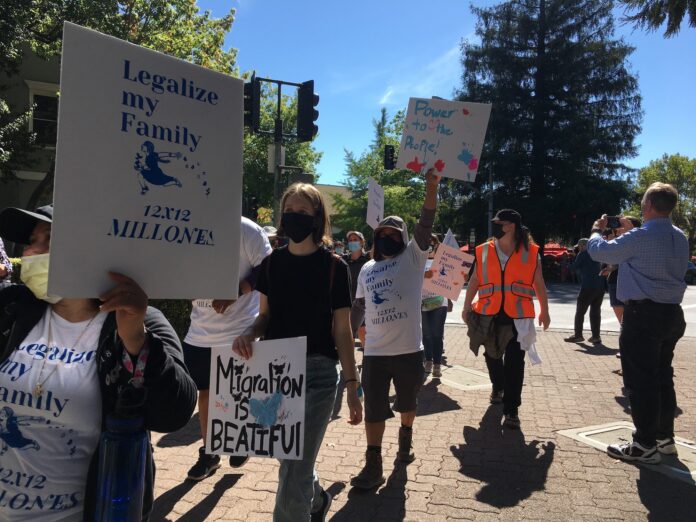They filed into the Healdsburg Plaza to the blare of a highly amplified brass band called Santo Domingo and the cheers of a crowd that had begun drifting in some two hours earlier.
Several dozen immigrant rights activists had walked 12 miles, starting at Tom Shopflin Fields at 9 am, Sunday, and arrived in Healdsburg at 2:30 pm. But despite their arduous journey, they looked energized and ready to celebrate.
Their caminata, or walk, was meant to capture the attention of the Sonoma County Board of Supervisors, which is expected to consider an immigrant and worker’s rights resolution in the near future.
“I personally hope our Congressional representatives, and our local supervisors, are shitting in their pants when they realize the power we have,” said Renee Saucedo, director of the Centro Laboral de Graton (Graton Day Labor Center) when the band stopped playing and she addressed the crowd of some 200 people, first in Spanish and then in English.
Saucedo is also the main organizer for ALMAS, Alianza de Mujeres Activas y Solidarias (Women’s Action and Solidarity Alliance). A program of the labor center, it assists immigrant and indigenous women in securing “dignified jobs,” learning their rights and developing leadership skills.
The Sonoma County caminata was one of a series of similar 12-mile walks taking place in several locations around the country. Each of the miles represents one million of the estimated 12 million undocumented immigrants in the United States.
“The caminata is the next step in our local campaign to push for just immigration reform,” Saucedo said in a telephone interview earlier in the week.
Fifth District Supervisor Lynda Hopkins has agreed to introduce the resolution, which was crafted by 15 community organizations.
Its provisions include a commitment to advocate for federal immigration reform, primarily a path to citizenship for undocumented immigrants. Saucedo said this would provide a “reasonable way” to apply for residency, and then citizenship.”
It also requires supervisors to support two separate state bills — the VISION Act (AB937), which would prohibit transfers from California jails and prisons to federal immigration enforcement, and The California Health and Safety for All Workers Act (SB321), which would provide safety measures for domestic workers and day laborers.
“We are focusing on SB321 because it has passed the legislature and is sitting on the governor’s desk waiting to be signed,” Saucedo said. “The other bill (AB937) has already died for this session.”
Locally the resolution would commit the county to support five provisions for farm workers — fresh drinking water and clean bathrooms, hazard pay during wildfires and other disasters, disaster insurance, information in both Spanish and English, and community safety observers.
It also requests that supervisors advocate for “more culturally competent disaster responses for immigrants and the indigenous community.” During the previous three wildfires, alerts and informational updates were only available in English. Also, primarily Spanish speakers, especially undocumented immigrants, were often treated poorly at the local shelters and had a difficult time accessing disaster relief after the fires were over.
According to Linda Evans of the North Bay Organizing Project, one of the groups sponsoring the resolution, there was a Zoom town hall meeting earlier this summer, concerning the resolution. She said all of the four supervisors who attended agreed to support it. The only supervisor who did not participate in the meeting was James Gore from the Fourth District.
If the supervisors were to pass the resolution it would not be enforceable, “but it would carry a lot of political weight,” according to Saucedo.
“It would send a clear message to the wineries and the other agricultural businesses,” she said.









